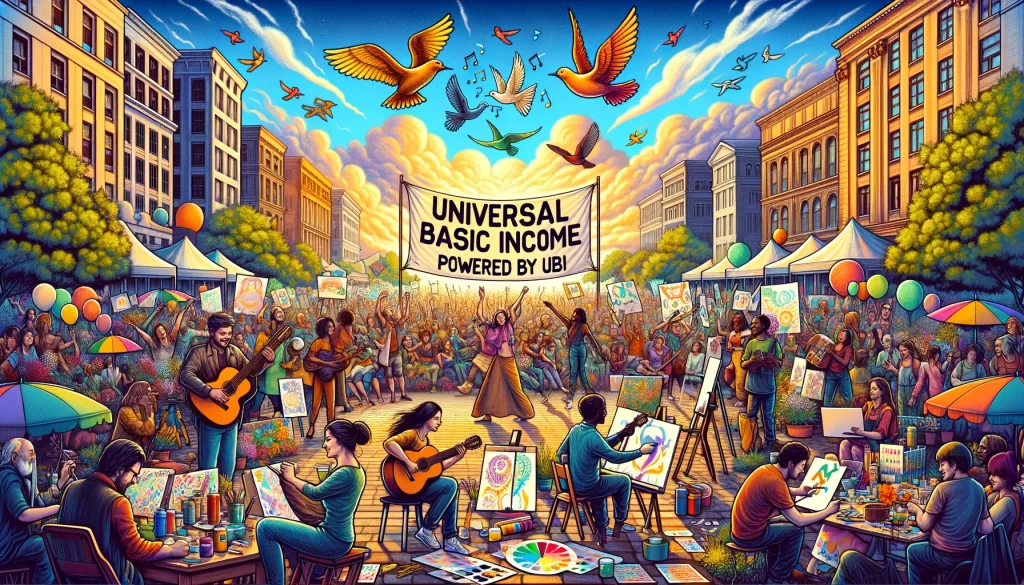Have you ever wondered about the idea of getting money from the government just for being a citizen, no strings attached? This concept, known as Universal Basic Income (UBI), might seem like a new trend, but it’s actually an old idea with a long and fascinating history.
The Early Seeds of UBI
Long before the term UBI was coined, ancient and prehistoric societies showed us examples of shared resources and communal support that resemble the spirit of UBI. In small nomadic groups, everyone had the right to use land to find food, and there wasn’t a concept of owning it. Imagine being able to pick fruits or hunt without worrying about trespassing because the land belonged to everyone.
Additionally, these early societies had a strong culture of sharing. If someone found a bounty of food, they shared it with the whole group, not just their family. This way of living ensured that everyone got what they needed to survive. Though these communities didn’t use money and thus didn’t have UBI in the way we think of it today, their practices reflected the principles behind UBI: ensuring everyone has access to essential resources.

From Ancient Athens to the 18th Century
Some trace UBI ideas back to ancient Athens, where revenue from a city-owned mine provided a small income to its citizens. However, this “income” was limited to a small elite group, excluding women, slaves, and noncitizens, who made up most of the population.
The more modern concept of UBI began taking shape in the 1790s with thinkers like Thomas Paine and Thomas Spence. Paine argued that since private land ownership prevented people from living off the land as they once could, they deserved compensation, suggesting a cash grant for adults and a pension for the elderly. Spence took it further, proposing regular, unconditional cash payments to everyone, making him a pioneer of the UBI concept.

The First Wave: Early 20th Century
By the 1900s, discussions around UBI, or what was then called a basic income guarantee (BIG), started to emerge, marking the first wave of support. This period saw various thinkers and activists proposing their versions of BIG, though they often used different names for it.
In Britain, notable figures like Bertrand Russell and Virginia Woolf praised the concept. The State Bonus League, although short-lived, attempted to bring BIG into public conversation with publications advocating for a bonus on national output.
Economists and social policy analysts of the time, including Nobel laureate James Meade and political theorist G. D. H. Cole, who first coined the term “basic income,” also contributed to the dialogue. Despite the growing interest, these early advocates struggled to translate their ideas into policy, and the outbreak of World War II shifted focus to other priorities.
Between the early discussions and the 1960s, the idea of a Basic Income Guarantee (BIG) was like a small flame kept alive by a group of thinkers who saw it as a promising alternative to the social policies of their time. This period set the stage for what we now call the second wave of support for BIG.
The Spark of the Second Wave
In the 1960s, the conversation around BIG really started to heat up in North America, thanks to three key groups:
- 1. Feminists and Welfare Rights Activists: These groups, including iconic figures like Martin Luther King Jr., were tired of the existing welfare programs that they saw as demeaning and insufficient. They fought for BIG as a way to provide dignity and a guaranteed income, breaking away from the stereotype of the “male breadwinner” and “housewife” model.
- 2. Futurists: People like Robert Theobald and Buckminster Fuller imagined a future where technological advances could threaten jobs. They argued that a guaranteed income could be a safety net against the uncertainties brought by automation, a conversation that is strikingly relevant today.
- 3. Economists: A number of Nobel Prize-winning economists and thought leaders started advocating for BIG as a more effective means to combat poverty. Their involvement brought the discussion into policy circles, catching the attention of media and policymakers.
Media Attention and Political Movement
As BIG gained traction, the media began to cover the idea more, especially when President Lyndon Johnson declared his War on Poverty. In Canada, the government explored the idea through favorable reports, suggesting that some form of BIG might be the future of social policy. This optimism crossed political lines, appealing to left-wing activists, centrists, conservatives, and libertarians alike for various reasons.
The U.S. House of Representatives even passed a bill for a version of BIG known as the Negative Income Tax (NIT), though it narrowly missed becoming law. Presidential candidates from both major parties endorsed similar proposals, showing a brief moment when BIG seemed like it might become a reality.
Challenges and Lost Opportunities
Despite these moments of progress, BIG faced significant challenges. The movement lacked widespread public support and political champions willing to push hard for it. Critics saw the proposed versions of BIG as too limited or conditional, and without a strong movement behind it, politicians had little to lose by letting the idea fade away.
The Second Wave’s Legacy
Though no country fully implemented UBI or NIT during this wave, the period wasn’t without its achievements. The United States and Canada conducted pioneering trials on BIG, and programs like food stamps, the EITC, and the Child Tax Credit were expanded as steps toward the idea.
Alaska introduced the Permanent Fund Dividend (PFD), providing yearly dividends to residents and coming close to a true UBI model. These successes showed that steps toward BIG could work and laid the groundwork for future discussions.
Between the Waves: Keeping the Flame Alive
The following decades saw BIG discussions move to the fringes of political discourse, but the idea never completely disappeared. Academics continued to explore UBI, forming networks and organizations to study and promote it. The Basic Income Earth Network (BIEN), originally focused on Europe, expanded globally, reflecting a growing interest in UBI beyond the political mainstream.
Laying the Groundwork for the Future
Despite feeling more like a discussion group than a movement in the late ’90s and early 2000s, these efforts were crucial. They increased public awareness and prepared the ground for a larger wave of support.
The Third Wave: UBI’s Global Momentum
Since 2010, the conversation around Universal Basic Income (UBI) has not just warmed up; it’s caught fire, spreading into mainstream media around the world. This burst of interest didn’t come from one place or person; it’s been a wave created by countless events and actions worldwide.
A New Era of Activism
The financial crisis of 2008, the Great Recession, and movements like the Arab Spring turned people’s attention sharply towards issues of poverty, inequality, and unemployment. In this climate, the idea of UBI found fertile ground, and activists saw an opportunity to push for change.
In Germany, a surge of interest in UBI began in 2008, with people from different political backgrounds proposing various UBI models. That same year, the first International Basic Income Week was organized, becoming an annual global event. Meanwhile, in Namibia, a significant UBI pilot project was launched, followed by other experiments in Brazil and India, drawing considerable media attention and sparking further interest in UBI around the world.
The Power of Citizens’ Initiatives
Europe saw a surge in UBI activism with two major citizens’ initiatives: one in Switzerland and another across the European Union. Although neither passed, they garnered hundreds of thousands of signatures, built a network for UBI activism, and drew global media attention.
Diverse Support for UBI
The UBI movement’s strength lies in its diversity, attracting support from various sectors and ideologies. Economists revisited the 1970s experiments on Negative Income Tax (NIT) in the US and Canada, sparking new discussions. Developing countries’ experiments with conditional cash transfers (CCTs) also added momentum, showing that easing conditions on welfare could have positive outcomes and nudging the conversation towards UBI.

The Role of Technology and Environmentalism
The fear of job loss due to automation and the precarious nature of gig economy work have made UBI a hot topic, especially in tech circles in the United States. Tech entrepreneurs have supported UBI as a response to these changes. Additionally, the connection between UBI and environmental strategies, like tax-and-dividend proposals to combat climate change, has brought environmentalists into the UBI fold.
A Wave of Experiments
The current wave of UBI support has led to new experiments worldwide, from Finland to Kenya, and many are privately funded due to budget constraints. One of the largest is GiveDirectly’s project in Kenya, aiming to be the most extensive UBI experiment ever.
Political Campaigns and COVID-19
Andrew Yang’s 2020 presidential campaign brought UBI into the American political spotlight, making it a central platform issue for the first time since the 1970s. The COVID-19 pandemic further propelled UBI discussions, as countries looked for ways to support their citizens through the crisis, highlighting UBI’s potential as both a safety net and an economic stimulant.
The Future of UBI
By 2019, it was clear that the third wave of UBI support had surpassed previous movements in both scope and impact, becoming the first truly global wave of support for the idea. However, challenges remain, particularly the rise of nationalism and its potential to shift focus away from social policies like UBI.
The story of UBI shows a pattern: it gains traction during times of societal need for new solutions to inequality, poverty, and unemployment but recedes when attention shifts or when other solutions become dominant. The main challenge facing the new interest in UBI is the rise of nationalism. If leaders who strongly support their country’s interests manage to make people believe that immigrants and foreign countries are the reason for increasing poverty, they might shift attention away from creating better policies that help everyone.
This article is based on the following article:
https://thereader.mitpress.mit.edu/the-deep-and-enduring-history-of-universal-basic-income/

Background Information
Understanding UBI involves looking at its historical roots, the philosophical and economic theories behind it, and the ways it’s being reconsidered in today’s world. By examining the contributions of key figures and the evolution of support for UBI, the reader can gain insights into how societies think about welfare, poverty, and economic justice.
What is Universal Basic Income (UBI)?
UBI is a financial policy proposal under which the government provides all citizens with a regular, unconditional sum of money, regardless of their employment status or wealth. The idea is to ensure that everyone has enough money to cover their basic needs, aiming to reduce poverty and inequality.
Historical Roots of UBI
The concept of UBI isn’t new. It has historical precedents in many early societies where resources were shared communally. For instance:
- Nomadic Societies: These societies operated on the principle that land was a common resource. Everyone could use the land, but no one owned it exclusively. This allowed people to gather food and resources freely.
- Hunter-Gatherer Communities: In these communities, sharing was a way of life. If someone found food, they shared it with the whole group, ensuring that everyone had enough to eat.
Important Figures and Concepts
- Thomas Paine (1737–1809): An influential thinker and writer who proposed the idea of providing a cash payment to all adults, funded by a tax on landowners. His work laid some of the earliest foundations for modern UBI discussions.
- Thomas Spence (1750–1814): Another early advocate for UBI, Spence suggested that the profits from land should be distributed to all people, a concept echoing today’s UBI discussions.
- Joseph Charlier (1816–1896): A Belgian author who proposed a form of UBI, emphasizing social justice and equitable distribution of wealth.
- Henry George (1839–1897): An economist who argued for a “Single Tax” on land to combat inequality and poverty. While not directly proposing UBI, his ideas influenced later thinking on wealth redistribution.
The Three Waves of UBI Support
- First Wave (1910-1940): Early discussions and proposals around basic income and social dividends, mainly among intellectuals and economists in Europe.
- Second Wave (1960s-1970s): A period marked by renewed interest in UBI, partly in response to social and economic changes, including the civil rights movement and concerns about automation.
- Third Wave (2010s-present): Characterized by a global resurgence of interest in UBI, driven by factors such as economic inequality, technological advancements, and the impact of the 2008 financial crisis.
Key Terms
- Basic Income Guarantee (BIG): A general term for policies similar to UBI, promising a basic income to all citizens.
- Negative Income Tax (NIT): A proposed form of income support that’s related to UBI, where people earning below a certain amount receive supplemental pay from the government instead of paying taxes.
- Conditional Cash Transfers (CCTs): Programs that provide money to poor families under certain conditions, like children attending school. While not UBI, CCTs are part of the broader discussion on poverty reduction and social support.
Please subscribe to Insight Fortnight, our biweekly newsletter!
